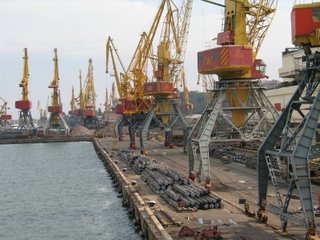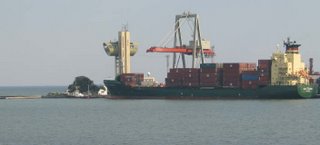Friday, March 31, 2006
More Promotion: Mila Vocal Ensemble CD Release Party
Come and soak up the arrival of Spring with music from the CD and Mila's extensive, 30-nation repertoire.
Mila Vocal Ensemble strives for a delicate balance between the raw sounds of the village and the requirements of staged performance/recording in their presentation of traditional, folk music.
(Their sound is as arranged for the stage/recording as I, the village-style fanatic, can tolerate, and they do beautiful things while not crossing the line of too much arranging and too much alteration. The show will be worth attending!)
Listen here for samples of their work on previous CDs (including one CD recorded when many of the current members of Mila were members of the Ethnic Dance Theater Vocal Ensemble), and check out this link to video of their live performance (2 songs) in the studios of Minnesota Public Radio recorded earlier this week.
See you tomorrow at the party/show!
To purchase tickets in advance on line, go here and scroll to the bottom.
A Do-able Plan?
The leader of the Socialist Party of Ukraine, Oleksandr Moroz, has come out in favour of a coalition including the Tymoshenko Bloc, "Our Ukraine" and the SPU.He spoke about this to journalists next to the Presidential Secretariat, after a meeting with President Victor Yushchenko."We are ready to support a memorandum on the principles of forming a coalition of three parties - the Tymoshenko Bloc, Our Ukraine, and SPU," said Moroz.
It should be a coalition of those people, for whom the majority of the electorate voted. That's because the election campaign was based on the alternative "either the people of the Maidan, or the Party of Regions." explained Moroz.
To summarize, in his words, about 70% of the electorate is not in favour of the Party of Regions.
According to him, the memorandum is to be signed "in the nearest days."
To this Moroz added, that he agrees with Yushchenko's thought that "we don't need to deepen the east-west fissure."
"We have to search for understanding. I would advocate a solution, in which the Party of Regions would nonetheless be represented in the power structures. In four or five oblasts they have a majority on the oblast councils. So it would only be natural that they hold the governorships too," added Moroz.
In his words, the possibility of achieving this solution will depend on Viktor Yanukovych.
Moroz said that in the formation of the government they will apply the principle that every party will take turns claiming a portfolio, and the remaining portfolios will be handed out on the basis of who has more votes in Parliament.
Moroz also said that other forces that are party to the coalition will not have veto power over ministerial candidacies.
In response to the question, will the Tymoshenko Bloc have the right to nominate the prime minister given that they earned the greatest number of votes in the coalition, Moroz answered "Yes, of course."
To this, the leader of the SPU added that a second option is being considered, in which the candidates for the posts of prime minister and speaker will have to be decided by consensus among the three parties.
On the question of Tymoshenko, Moroz said that he had met with her, and "she did not use the language of ultimatums."
Concerning his meeting with Yushchenko, Moroz explained: "We did not agree to anything, but the above mentioned negotiations are taking place."
This plan seems to fit all the pieces of the election puzzle together the best, given that it now seems that the Socialists have agreed to work with BjuT to form the majority only with Our Ukraine; i.e., that they agree with BjuT that the government should be based on "the people of the Maidan," not of the Regions. . .
If all this really is the case, then it seems that Our Ukraine are now, for the moment, the King-makers.
Our Ukraine can still decide to take its 1/3 of the Maidan votes (as the Socialists and BjuT together have more or less 2/3 of pro-Orange votes) and form a coalition with the Regions on the basis of what could be summarized as the stance that what is needed is post-OR reconciliation. . .
Also, Tymoshenko is allegedly pledging to be more business-friendly (i.e., no more reprivatizations, presumably. . .)
Another oped article by RFE's Roman Kupchinsky here; not quite sure what he means by the last line. . .
Thursday, March 30, 2006
Gas Deal and Tieing Up Some Loose Ends
The official residence of the managing director of a company now set to control Ukraine's supply of natural gas is a one-story, clapboard house in a tumbledown village bordering a defunct collective farm outside Moscow. A dirty rug covers the floor, a bare light bulb hangs from the ceiling and scraps of plywood plug gaps in the wall.Read on at either link above. . .Olga P. Sakharova, 49, lives there with her mother and a German fox terrier called Lyusa and has never heard of the director, Oleg A. Palchikov, who operates a business worth $7 billion a year.
"What boss would want to live here?" Ms. Sakharova asked, surprised to learn that she occupied one of the few known addresses of any of the executives of the shadowy gas trading company involved in a deal between Ukraine and Russia that continues to roil politics here in Kiev, nearly 400 miles away.
The sites most frequently updating about developments in Ukraine vis-a-vis the elections are foreign notes and neeka's backlog. Both sites have factual information and other stuff, opinion and other non-election related stuff.
Here's what happened:

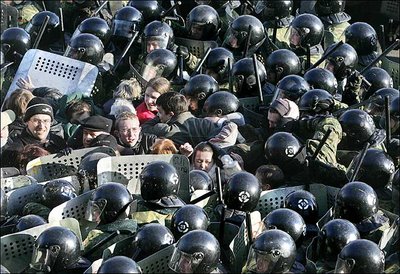
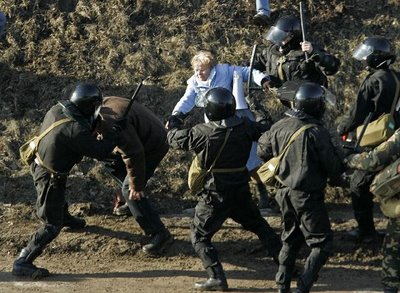 The first photo is from this set; the last two photos are from here.
The first photo is from this set; the last two photos are from here.Read this here ("A Rebith of Opposition, or A Rebirth of Fear?") for a summary and some thoughts and read this NYTimes piece ("Belarus To Charge Defeated Candidate Who Led Protest").
And look at the pics here of a demo at the Belarusian State TV that happened just the other day W, March 29, after the crackdown.
Shchyro djakuju, Neeka, for all the links on your site and at your global voices site. . .
And wait, Stephan at Everybody I Love You did an interesting piece comparing Lukashenka and the Bush administration's record on free and fair elections; he also has some other posts about the situation in Belarus' and a few pieces about the Ukrainian elections.
Tuesday, March 28, 2006
Why Yulia Tymoshenko Deserves a Second Chance as PM
[Update: "Deserves" is not the right word in the title above: "Should Get" should have been the phrase in the title. I don't think many of the current political big-wigs in Ukraine "deserve" the post . .]
Just quick a note run off the top of my head (I'm workin' on a web design that I can't concentrate on until I get these thoughts out from jiggling 'round my head):
Tymoshenko deserves should get another chance, if for just one reason:
The Orange Revolution was not singularly about market values (which the recent vote to my mind confirms; see my post below). It may have been that for Yushchenko (though he used more and more populist rhetoric, starting in the middle of the summer of 2004, as the elections approached) and for the West, but as far as I experienced it, most Ukrainians were motivated to join the protest for a variety of, albeit often conflicting, goals that were rooted as much in non-market values (social justice, social programs) as pro-market ones.
Who will strike the best balance between these two sides of the OR coin? I am not exactly sure anymore that Tymoshenko is the ideal leader in this regard, but I want to see her try again. However, along with all of those who voted a pro-Orange protest vote (either for BjuT or the Socialists or Pora-PRP), I certainly don’t think that Yushchenko’s government was heading in the right direction of a proper balance. . .
In short, populism is a stance and not just a bunch of rhetoric and a set of slogans, though Tymoshenko was not at all explicit about specifics on policy during the campaign--except for stating unequivocally that she was against the gas deal and against forming a partnership with the Regions--which does worry me (but her positions on the gas deal and the Regions do not worry me!). However, neither has anyone else been specific in this campaign. As other Ukrainebloggers have noted, this was yet another election campaign season based on personality rather than substance and specific proposals.
If she is PM this time, both she and Yushchenko must agree on a program, and once that is agreed upon there can be no deviation from either side. Yushchenko really messed things up last time around by endowing Poroshenko with such powers to conflict with Tymoshenko. He messed things up last time around by being equivocal. This time, he must commit. So must she, if it turns out that she must commit to fewer reprivatizations and make other concessions to the Our Ukraine, free market liberalism approach (she should not get involved with price-setting again, for example). And as PM, she must prove that she is not herself a crony capitalist, as she was accused in relation to Nikopol.
But she should be given another chance. She is smart enough to handle doing some things in ways that are not to her liking for the sake of a stable Orange-coalition government. I personally do not have such a character; I find it very hard to back or enforce decisions or approaches that I do not like or approve of, but I think she is, well, cunning enough of a character to do so. She will have to check her ambition, but it will be much easier for her if, this time, Yushchenko doesn’t burry a knife in her back from the get to. To my mind, she was showing the signs of someone coming undone because of all the things going on behind her back; which is quite reasonable. I think she would have been much more willing to cooperate with the president if she had not constantly had the gnat Poroshenko buzzing around and biting her where it counts.
But to prevent Yushchenko from doing so again or for going for a Regions coalition, she is going to have to agree to drift closer to some of his positions.
Perhaps I am not entitled to my opinion as I am not a Ukrainian citizen and am writing from the US of A. But then again, lots of very poor people in Ukraine also voted for (what I am interpreting here as) a better balance between the market and nonmarket values raised by the Orange Revolution. This includes members of my own family in both Central and Western Ukraine; some voted for Yushchenko, some for Moroz, and quite a few for Tymoshenko. (Though I have not found out for sure yet, I pretty certain that some of my Poltava family voted for Regions.)Monday, March 27, 2006
Media Inaccuracies about the Elections
Then there was the Washington Post article that was reprinted in our local Minneapolis paper with the headline, "Voters turn away from Orange Revolution."
What?
The article as printed in the Post was a slight bit more accurately entitled, "Ruling Party Suffers Rout in Ukraine" by Peter Finn, who nonetheless did talk about the election as Yanukovych's big comeback. . .
Because of all this, I had the following chat tonight with some Latvian friends (of varying ages, from 30 somethings on up to 50 somethings) about the elections. "My god, what's happening in Ukraine?" one fellow asked. "We [Latvians] all know that the long-term Russian plan is to swallow Latvia whole again, but my god, we thought you Ukrainians would slow the Russian machinary down a bit!"
I told him to hold his horses, that there would be no need anytime soon (hopefully never) to send his sons, with their Latvian scouting skills, to the motherland to defend against an eminent Russian invasion. For as we all know: Nothing is said and done until we see who emerges as PM. I am loath to make any prediction.
Thus there is no comeback as of yet for Yanukovych and Ukraine's voters have not turned their backs on the OR. Neither Ya nor the Regions party disappeared after the OR, and in fact, Ya has recieved fewer votes (vis-a-vis his party) in this parliamentary election than he did in the presidential election. So this is all premature talk. There is the chance that he may return as PM, but that will in very large part depend on Yushchenko's response to the bigger news story of this election (see next paragraph). Furthermore, there are those pundits out there who argue that it is inaccurate to assert that, without a doubt, Ukraine will necessarily race back into the Russian orbit and redevelop a pre-OR political culture in the event that Ya becomes PM again. . .I am not entirely convinced of this, but anyway. . .
So the big story here (since it's not news that Ukraine has an East-West divide and that Ya performed as everyone expected him to) is the protest vote against Yushchenko's handling of reforms embodied by Tymoshenko's and the Socialist's performance.
In other words, the story is not that Ya has made a comeback (yet), nor that Ukrainians have turned their backs on the OR; the story is that the majority of pro-Orange Ukrainians have told Yushchenko that they don't want further compromise with the Party of Regions and that they want a harder pro-reform line.
The next big story will be all about coalition building, of course. I don't pretend to be saying anything original here.
[Update: just noticed that bob at abdymok and One Eyed Cat at OrangeRevolution have made similar points here and here.]
Btw, there is some good journalism out there on the elections. Via Dominique Arel's Ukraine List, I spotted a good article in the Guardian entitled "The Future's Still Orange" (WOW! In the Guardian! A good article on Ukraine!), and in the Warsaw-based Gazeta Wyborcza there's "The Revolution is not Lost."
For those of you who don't get the Ukraine List:
a) You can write to Mr. Arel at darel@uottawa.ca to request a free subscription;
b) A thought-piece on the elections via the Ukraine List from Taras Kuzio:
Ukraine's 2006 Elections (Taras Kuzio):
1. The elections will be declared to have been held in a free and fair manner, the first in Ukraine since 1994. This will be contrasted to elections in Belarus and the generally poor democratic situation in the CIS. The OSCE/Council of Europe/EU have given high remarks to the elections.
2. Yushchenko can take great credit for this progress.
3. The holding of free and fair elections will put pressure on the EU to change its passivity which is in place since Yushchenko's election.
4. Voting patterns resemble 2004, except Yanukovych will not obtain 44% as he did then. But, it's still early as only 20% of the votes have been counted.
5. Yushchenko (and thereby Our Ukraine) is a "kamikaze" president. He made countless mistakes in 2005, including sacking the Tymoshenko government and dividing the Orange camp, signing a Memo with Yanukovych and keeping Prosecutor Piskun until October, thereby not following through on instituting charges against high level officials, and he mishandled the gas contract. Yushchenko also wasted a year when he had Kuchma's powers and failed to use them to stamp his authority on the country.
6. Tymoshenko came second because of Yushchenko's "kamikaze" mistakes that led to a Orange protest vote going to her, rather than to Pora. Our Ukraine proved to be arrogant, both vis-a-vis Orange voters and vis-a-vis Yushchenko himself. Senior Orange businessmen accused of corruption in September refused to back down from standing in Our Ukraine, ignoring Yushchenko's advice. Political parties in Our Ukraine refused to merge into a single pro-presidential party.
7. Economics never did, and did not in these elections, drive Ukrainian voters. Whether Ukraine has 2% or 12% GDP is not something that guides Ukrainian voters. Negative voting s always a major factor in Ukraine's elections.
8. An Orange coalition was always the most realistic choice for Ukraine for two reasons:
a) to send a signal to the West and Russia about the sustainability of the Orange Revolution and democratic change
b) any deal with Yanukovych/Regions would have been the political death for Yushchenko. This is what I have been saying for weeks and it is echoed by comments from Lytvyn, Tymoshenko, Ryabchuk and others. Our Ukraine coming in third have no political strength to do a deal with Regions which have a lot more votes.
9. Yushchenko failed to understand an important, perhaps most important, factor driving the Orange Revolution - the sense of feelings of injustice against abuse of office, corruption and "Bandits" running Ukraine. Prime Minister Yuriy Yekhanurov totally misunderstood this feeling, as seen by his invitation to Ukraine's oligarchs to a meeting in October where he described them as "Ukraine's national bourgoiese." The Rule Of Law cannot move ahead without dealing with these issues from the past - election fraud in 2004, high level corruption, who ordered the Gongadze murder and Yushchenko's assasination.
10. Yanukovych is not a reformed leader:
a) he sent greetings to Lukashenko on his "victory." Yushchenko and the Ministry of Foreign Affairs followed the Western position on the Belarus elections.
b) he has never acknowledged his defeat in 2004. The top five in Regions included Yanukovych, the crazy Taras Chornovil, separatist Yevhen Kushnariov, and others who were a poor choice if Yanukovych wanted to show a conciliatory position. Throughout the elections they have continued to denounce the legitimacy of the Orange Revolution as a "illegal coup," "Orange rats," etc, etc.
c) US comment on Regions is confusing: should we take their program for its face value (Anders Aslund) or should we ignore the program as there are pro-European businessmen ready to change the face of Regions (Adrian Karatnycky). If it is the former then Regions is (in addition to economic reform) against NATO membership, for full membership in the CIS Single Economic Space, and Russian as a state language. Regions voted against WTO legislation.
d) Regions will vote with the government on certain issues dealing with economics.
11. Tymoshenko might become Prime Minister or Rada speaker. Her record in office is mixed, not purely black. Much of what Yushchenko/Our Ukraine have taken credit for economically was initiated under her government.
12. These elections show Ukraine's democratic progress has consolidated after the Orange Revolution. The choice of an Orange coalition makes it more likely Ukraine will obtain a MAP in Riga in November. Judgements about Ukraine's democratic progress should not be influenced negatively by dislike of the ensuing parliamentary coalition.
13. I doubt parliament will last its full term of five years. The contradictions inherent in particular insides the Party of Regions will lead it to implode.
Sunday, March 26, 2006
Ukraine's Elections Thus Far, My 2 Cents Worth
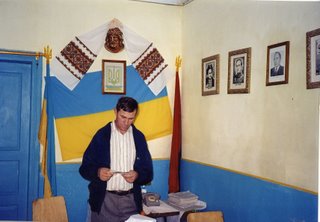 Hryts Kolodnytskyj in the Tymoshenko HQ in Pidhajtsi
Hryts Kolodnytskyj in the Tymoshenko HQ in PidhajtsiThings went off smoothly, though it seems like it was a really, really busy day at voting centers all over Ukraine.
I talked with Oksana in Pidhajtsi, where she has been working at an election center (that's her father above).
 She said that she expected to be up until all hours of the night counting votes. She talked about the huge number of parties running in the elections, about some old people having a difficult time with the 5 (or was it 4? I forget. . .) bulletins with the zillions of little partylettes to choose from, and she mentioned the incredible turnout of voters. She said that some official had said that voter turnout in Pidhajsti may be as high or even higher than it was during the presidential elections.
She said that she expected to be up until all hours of the night counting votes. She talked about the huge number of parties running in the elections, about some old people having a difficult time with the 5 (or was it 4? I forget. . .) bulletins with the zillions of little partylettes to choose from, and she mentioned the incredible turnout of voters. She said that some official had said that voter turnout in Pidhajsti may be as high or even higher than it was during the presidential elections.I will be very interested to learn, then, how this most fiercely pro-Orange and patriotic of towns voted in these parliamentary elections.
I envision that it will split with nearly equal groups for Yushchenko and Tymoshenko (though I am guessing that Tymoshenko will take the most votes), and that there will be some votes for Pora-PRP, and some for the Party of Regions.
Thursday, March 23, 2006
Belated Promotion of Friends and Real Folk Style
I usually mention concerts if they involve beloved friends or something really worth seeing. Well, I forgot to post about OBI's concert last week in Minneapolis at the locally cherished Cedar Cultural Center, the best place to catch real folk troupes from around the world playing in Minneapolis. For example, over the years a number of Hungarian ensembles have toured the US and stopped by there. Some of those troupes had members who were real, village-based players with no university training in music at all; otherwise, all of them had members who had trained in villages with real village players as part of their schooling. Hungary is one country whose presentation of folk dance and music was transformed by a back-to-the-village /authenticity movement (i.e., they threw out the Bullshitski-style or the formalism that had made folk dancing into character ballet). Ensembles in Bulgaria--from the state ensemble on down--also have a strong, village-based style, and Hungarian and Bulgarian troupes continue to be exemplary for authenticity enthusiasts who like to see staged performances of folk dancing.
However, there are some real hard-nosed authenticity-folk for whom going to a show is frivolous: either you participate in the music-making and dancing, or you watch real people in real settings really doing it all, or you just forget about it. That's not me, but I understand the impulse to participate and have it be real rather than sit back and consume. I guess that's why I am a performer. They are a minority within a minority.
(For me, the real test of a troupe's value is this: Do I feel like I am watching people in a village or at a wedding dancing, albeit in a village or at a wedding where everyone is a really good dancer? If there are pointed toes and obvious ballet moves, or if it is all too obvious that the dancers have lots of ballet training, I feel cheated. If this does not help explain things, then you really have to watch either the state ensemble of Hungary or Bulgaria to get a sense ofwhat I mean. Unfortunately, no Ukrainian troupe that I have seen has matched this style; however, I have certainly not seen every troupe there is to see. . ..)
All of this stuff that I have talked about on this blog about authentic v. the kitch of the Sovietski-Bullshitski style is true about American folk music, too. Bluegrass is the American folk music version of Sovietski-Bullshitski (since we are talking about a process of modernizing the peasants and making kitch of their culture for a broader, bourgeois audience that took place everywhere throughout the 20th century). There are plenty of olde-tyme music enthusiasts who don't care much for Bluegrass (while there are plenty who like both styles). The real thing from which both olde-tyme and Bluegrass music derive is often called the "American-primitive style" by knowledgeable folk music lovers in the US. (Olde-tyme music, however, is incomparably closer to real, so-called "primitive" playing than flashy and schooled Bluegrass stuff.)
Anyhow, those Hungarian shows were fantastic, as was OBI's. . .lots of great playing and dancing.
Personally, I am enthusiast of Carpathian Mountian region dances, while Hungarian- Transylvanian and Hutsul music and dance are my true passion and first love(s).
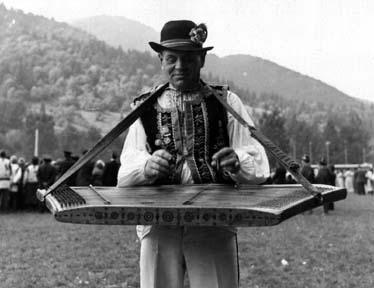
PS--If you are in Kyiv, ask around for info about where and when you can catch a show or a folk dancing night at which either Buttja or Bozhychi will be playing. Also, there is a place in Kyiv to go recreational folk dancing with live, real folk music every Friday (or at least, it used to be every Friday). Email me and I will tell you where it is (the locale is small, and I don't want to send anyone there who isn't serious about wanting to participate in or learn more about real Ukrainian dancing and music). There are a few other music troupes out there that I know about and lots of other ways to experience real folk music and dance in Ukraine, but I am tired of writing for now. . .
Tuesday, March 21, 2006
Elections in Belarus' III
Then also, I did not include this in my short list of links to check out for what's happening in Belarus.
Today, he writes this very important bit of info:
March 21st, 2006Finally, some more pictures of the scene on October Square, of what remains of the demonstrations for today.Police arrests all those who try to go to the October square with big bags, food and hot drinks. That’s the tacticts they chose: they don’t touch the people on the October square, but they sort of put it under siege, hoping that people will freeze, starve and go home.
So far, there are conflicting reports as for the number of detained activists, but for sure at least 50-100 people were arrested of those who tried to bring food to the protesters. Among them is the chief editor of a well-known Belarusian newspaper “Nasha Niva” Andrej Dynko. One famous theater director and several politicians went missing (probably, also arrested).
About 300-500 people spent the whole night on the square at subzero tempretures, and now their numbers are slowly growing. Many more people are expected to join them in the evening, if they will be able to pass through police blocks.
Update: Just noticed that Leopolis is posting some thoughts about the Belarusian Elections combined with some thoughts on the upcoming Ukrainian ones, and wrote this great comment about dumb leftists who are too ideologically preoccupied to be able to distinguish a horse from a donkey:
While the OSCE declares that the Belarus presidential elections "did not meet the required international standards for free and fair elections," the British Helsinki Human Rights Group offers tired, worn out, ideologically-driven commentary: "Belarus: imperialist intervention in presidential election." BHHRG are bit like creationists. In the face of ample evidence of election fraud and intimidation in Belarus, they would rather talk about Soros, US imperialism and agression, and neo-cons. The Devil manipulated the fossil record to trick us!Finally, a great article from EDM here.
Monday, March 20, 2006
Gas Explosions Common in Ukraine?
Gas explosion partially destroys western Ukrainian home, injuring three people
Mar 20 2006, 12:15
(AP) A gas explosion partially destroyed a western Ukraine home on Monday, injuring three people, emergency officials said.
The explosion struck the four-story home around 9 a.m. (0700 GMT), the Emergency Situations Ministry said in a statement.
Rescuers said three people were injured, including two who were hospitalized in serious condition.
The home's other residents were evacuated, and emergency crews were searching the building for other victims.
A preliminary investigation suggested a gas leaked was the cause. Gas explosions are common in Ukraine, where most residents use natural gas for cooking.
Is this last line true? Whenever in Pidhajtsi, I frequently wonder about the potential for gas explosions. I constantly am smelling gas in the air when there--gas in the house, or gas on the street leaking from a nearby, above-ground stretch of pipe, just gas, gas, and more haz. I really do wonder if there are not frequent explosions. Not that I saw people being careless about how they used gas--though I did see people being what were to my eyes (as someone from a society that at one point was trying hard to inculcate a culture of conservation) totally careless about HOW MUCH they used. It was just that, having knowledge about the decayed state of the whole of Ukraine's infrastructure combined with the frequency with which I smelled gas, I was freaked out now and again. Is this house, which has gas pumping into the pichka right next to where I am going to bed in a room in which I can smell a slight whiff of gas, going to explode before I get up in the middle of the night to turn the gas off? If I were a miner in Ukraine, I would be even more anxiety-ridden. You hear about mine explosions, but never about home explosions. . .How common is this, or is this AP comment merely a bit of journalistic hyperbole?
The Elections in Belarus II
Here are some photos I got via links on Neeka's Backlog and some of the other sites listed in the post below; for more photos, go to this flikr page associated with the Belarus Election 2006 site, and also Radio Freedom (Belarusian service) both for more pictures and for commentary in Belarusian--it's fascinating, good reading practice for those who don't know Belarusian but who read Ukrainian and/or Russian!

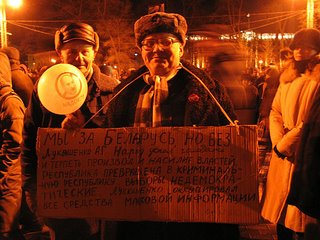
Sunday, March 19, 2006
The Elections in Belarus'
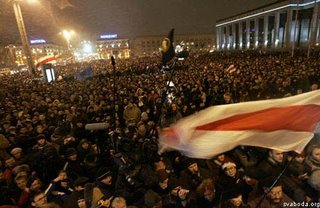
About the elections in Belarus', I have nothing original to add to what in general is already being said in the blogosphere, so here's a round up of sites covering the elections to check out: Neeka's Backlog, Taking Aim, Belarus Elections 2006, and then Publius Pundit (go to the bottom of this post to read my qualification for including a link to this particular site).
As for what I do have to say, well, I want to take on yet another fellow Leftist that I think can not distinguish a horse from a donkey. So first have a look at this short comment from this blog, which in general is full of various posts praising not just Lukashenka, but Milosevic and other supposedly *genuine* heroes of the Left as well. (Anyone remeber Dianna Johnstone's defense of Milosevic during the Kosovo crisis? Sure, the NATO bombing of Serbia was ridiculous, but so was defending Milosevic.)
So the writer of the blog, Neil Clark, supposes that because the West supports the opposition and the opposition has more or less repudiated the language of left-wing politics and uses pro-Western rhetoric, the Belarusyn opposition, like the Ukrainian-Georgian-Yugoslav oppositions that came before it, must be nothing more than a neocon tool made up of Western stooges that are trying to pull off yet another colored coup.
Also, since Lukashenka opposes the WTO, the World Bank and IMF, and NATO too, he is laubable as a sincere, anti-New World Order warrior who is supposedly a respectably-independent, anti-free trade, pro-soveriegnty and anti-globalization figure.
Never mind that in Belarus', just as in Ukraine, most sincerely-knowledgeable and pro-democracy groups and individuals, the counterculture, and even lots of everyday folks with lots of socialistic ideas of how the country should develop post-revolution, support the opposition. Also never mind that Lukashenka's anti-free trade stance is a regressive and not a progressice one (not at all progressive in such manner as are Chavez's or Morales' opposition to free trade). That is, never mind that his anti-globalization stance is merely a tool of his opposition to democratization, whereas opposition to these institutions of the New World Order in other parts of the globe are part and parcel of a strategy of breaking free of the neoliberal stranglehold on democracy. (That is, both Lukashenka and the WTO intend to limit democratic participation in the decision-making proceses that they control; Lukashenka wants control of all the decision-making within his country, while the WTO presently functions as an institution that limits democratic participation in decisions about the global economy.)
In short, never mind the fact that it is false to assume that just because one opposes the WTO, World Bank and IMF, one also supports democracy and/or the people. Never mind that Eastern Europe is not Latin America, and that Western power is not monolithic; or, to put it another way, never mind that Western power does not function the same everywhere. Which is to say, never mind that power games are different in different regions of the world.
One really must think in micro as much as macropolitical terms (to borrow Foucaldian or Deleuzoguattarian, or "poststructuralist," terms), and this guy's writing really demonstrates the truth of the Emersonian principle that, "a foolish consistency is the hobgoblin of little minds. . ."
Also never mind that Lukashenka is deeply dependent on support from Russia. That is, never mind that he is a stooge of the ideology of a united Great Russian people and that his conflicts with Putin's Russia do not reveal any real independence from Moscow, but only a conflict based on the fact that Lukashenka envisions himself and not Putin as the Batko of that reunited East Slav-cum-Great Russian people (where Batko is a term that means"father," in the sense of a leader that is like a dad leading the social family body, and therefore which is perhaps even translatable as fuehrer). Never mind that he is anti-democratic to the chore and runs his country in many ways unchanged from Soviet times.
Also never mind that that quality of life in any society can not be measured in a simple, positivistic and economistic manner. That is, just because Belarusyns enjoy one of the most equitable distributions of wealth does not necessarily spell out that the majority of them are content and/or happy. That is, Mr. Clark made noise that Lukashenka should be defended because of the equitable distribution of wealth in Belarus, suggesting that if he were to fall to a popular rebellion, it would have to be because the masses were duped by Western machinations--not due to his authoritarian means or any other possible complaints about his rule.
In favor of Stalin, too, anyone? Stalin did a good job of equalizing things through authoritarian means.
This argument for Lukashenka is similar to the pro-Yanukovych one that argued that Ukraine's economy grew under him (which was a false argument, anyway; see this here). It is also similar to the argument which holds that the Soviet Union collapsed despite its achievement of universal this and that and a highly equitable distribution of wealth because the Soviet multitude had become unwitting stooges of the consumerist West. Forget the authoritarianism, murder, slaughter, etc. of either Yanukovych's style or of that of the USSR. I suppose Cuban dissidents are also tools of the West, and that Castro, the anti-gay and anti-dissent ruler is also great just because of the universal this and that Cuba has achieved. And on and on to more foolish consistencies (that are consistent only from a certain point of view). . .
In this point of view, people like Ukraine's Natalia Vitrenko also become praiseworthy and become truly populist, anti-neoliberals with love of the people in their hearts. Vitrenko, in reply to a question about her policy for economic improvement in the most impoverished regions of Western Ukraine put to her before the 2nd round of the 2004 elections, once replied, "Conscription, Army, Chechnya."
A progressive supporting Lukashenka is no different from an American progressive supporting Pat Buchanan because of the stances he takes against US imperialism.
Here are two links, one to a piece I wrote in and sent from day one of the OR in Ukraine, and one to a piece I wrote about Day 1 months later.
PS--about Publius Pundit: I rarely link to this site, as they mostly are stooges of the necon notion that democracy is spread through US weapons and bombs, and thus are fans of American unilateralism, militarism, and seem to agree with the theory of American exceptionalism. They also hold the ridiculous notion that Chavez and Morales are dictators and are the equal of Castro and Putin. Thus, though it is a site that swallows the Bush administration's propaganda (that it is engaged in a supposedly altruistic, pro-democracy crusade) hook, line and sinker, they do occassionally post pieces worth reading. . .
Wednesday, March 15, 2006
Photos of My Favorite City in Ukraine
Well, I am in St. Louis, Missouri on a contract job this week; love the job, but I have been too tired at night to read. I have no idea how things this week are progressing in Ukraine, but for the fact that back in Pidhajtsi, Hryts Kolodnytskyj is struggling to keep up with the stress of his job as head of the Shtab Tymoshenka (of the election campaign HQ for Yulia Tymoshenko) in Pidhajtsi. I get the feeling from family there that the town of Pidhajtsi will split in half for Yushchenko and Tymoshenko. .
Anyhow, below are some pictures of one of my favorite cities in the world, which is a most-favored city for many others as well, and which happens to be in Ukraine. However, it is a place with an exceptionally strong sense of local identity, where many locals--especially taxi drivers--will insist that they are more properly identified as citizens of their city than as belonging to either Ukraine or Russia. . .
It really is a city-state republic in character and mentality, so it seems to me, that already functions in a de facto way as an autonomous, city-state republic within Ukraine.
I wanted to post these and more to my fotopages, but something seems messed up with that site today.
(Containers Are Big Money)
Wednesday, March 08, 2006
Carpathian Adventures at Foto Dykun

Updated today: I have posted three sets of photos of trips to the Carpathians at my fotopage here. There are photos and three brief travel essays over there with info that some folks wanting to travel in the region may find valuable. Also, there are some brief comments about real folk music and dance versus what I call--following the lead of my teacher, folk dance ethnologist and director of EDT Don LaCourse--"Sovietski Bullshitski."





